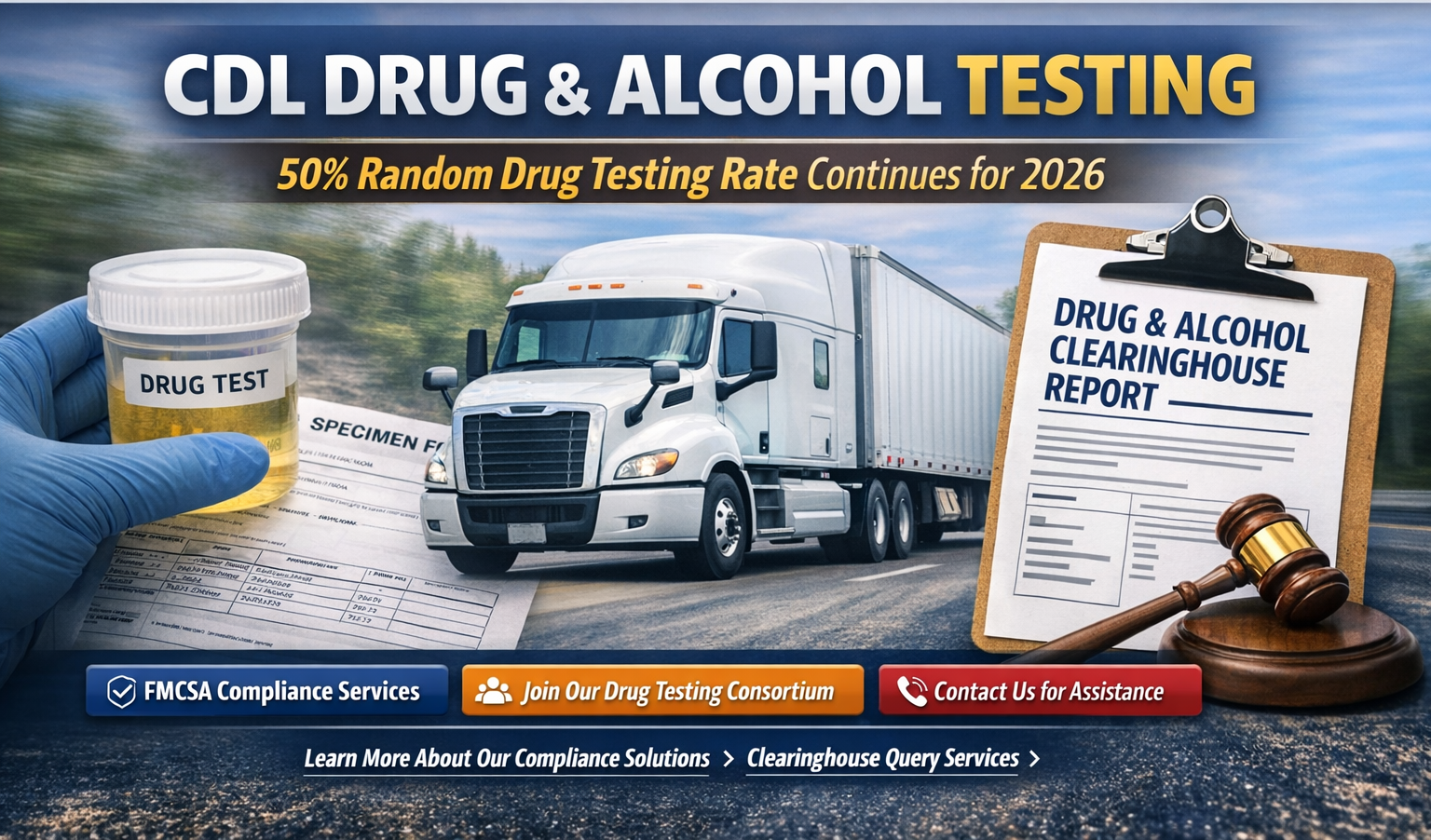A Guide to Truck Driver Background Checks
July 30, 2025
Share this article:
Why Background Checks Matter in Trucking
In the trucking industry, hiring qualified, responsible drivers is essential for safety, compliance, and operational success. A single poor hiring decision can lead to accidents, violations, lawsuits, and increased insurance costs. That is why performing a thorough truck driver background check is not just a formality. It is a critical part of protecting your fleet and your business.
Background checks help uncover any history of unsafe driving behavior, criminal activity, or disqualifying incidents that could pose a risk on the road. They also ensure your company meets the standards set by the Federal Motor Carrier Safety Administration (FMCSA) for hiring commercial drivers. For fleet operators and safety managers, background checks are the first step in building a reliable, audit-ready team that keeps your operation running smoothly.
What Shows Up on a DOT Background Check
A DOT background check provides a detailed look into a driver’s history to determine if they meet federal safety standards. It includes several key components that go beyond a basic employment screening:
- Motor Vehicle Record (MVR): Retrieves records from each state where the driver held a license in the past three years. This includes moving violations, license suspensions, and revocations.
- Previous Employment Verification:
Confirms employment with DOT-regulated employers over the past three years. This step checks for safety-sensitive duties performed, accident history,
drug and alcohol test results, and any test refusals.
- FMCSA Drug and Alcohol Clearinghouse Query: Identifies any drug or alcohol program violations that would disqualify a driver from operating a commercial motor vehicle.
Each part of the truck driver background check is essential for making safe, compliant hiring decisions that protect your company and the public.
FMCSA Requirements for Pre-Employment Screening
The Federal Motor Carrier Safety Administration (FMCSA) requires all motor carriers to complete specific pre-employment screening steps before placing a driver behind the wheel of a commercial motor vehicle. These steps are in place to help employers identify qualified candidates and avoid placing high-risk individuals in safety-sensitive roles.
To stay compliant with FMCSA regulations, employers must:
- Investigate the driver’s employment history with DOT-regulated carriers over the past three years. This includes confirming prior job responsibilities, safety performance, and any incidents or violations.
- Request the Motor Vehicle Record (MVR) from every state where the driver held a license in the past three years. This reveals license status, moving violations, and any suspensions or revocations.
- Run a full query in the FMCSA Drug and Alcohol Clearinghouse. Employers must obtain the driver’s consent and check for any violations that would disqualify them from operating a commercial vehicle.
- Administer a pre-employment drug test. The driver must test negative before performing any safety-sensitive duties.
These steps form the foundation of a compliant truck driver background check and help reduce risk from day one.
How to Conduct a Compliant Background Check
Conducting a background check that meets DOT and FMCSA standards requires more than running a basic criminal or driving history report. It involves a structured process that gathers and verifies specific information within defined timelines and formats.
To conduct a compliant truck driver background check, follow these steps:
- Obtain written consent from the applicant. FMCSA regulations require that drivers give permission before you access their records or contact previous employers.
- Contact previous DOT-regulated employers. Request information about the applicant’s job performance, accident history, and drug and alcohol testing results. This must cover the past three years.
- Check the FMCSA Drug and Alcohol Clearinghouse. Submit a full query after receiving the driver’s electronic consent to identify any violations or refusals to test.
- Pull MVRs from each state where the applicant held a license. This must be done within 30 days of the employment start date and should be reviewed for any red flags.
- Document every step of the process. Maintain detailed records of all inquiries, responses, and decisions. This is essential if your company is ever audited by the DOT.
Working with a compliance partner like National Fleet Services can streamline this process and reduce the chance of errors or oversights. Our team helps you stay audit-ready by managing the background check process from start to finish.
Red Flags to Watch For When Hiring Drivers
Even when all the required checks are performed, it’s important to know what warning signs to look for in a candidate’s background. Identifying red flags early can help you avoid hiring drivers who may pose a risk to your company’s safety record and compliance standing.
Common red flags in a truck driver background check include:
- Multiple moving violations or accidents within a short period. A pattern of unsafe driving behavior may suggest poor judgment or disregard for safety protocols.
- License suspensions or revocations. These can indicate serious infractions such as driving under the influence or repeated violations.
- Drug or alcohol violations listed in the Clearinghouse. Any unresolved issues or refusals to test should disqualify the applicant from operating a commercial vehicle.
- Gaps or inconsistencies in employment history. Unexplained time periods or mismatched job titles could point to attempts to conceal prior issues.
- Poor performance reports from former employers. Negative feedback about reliability, conduct, or adherence to regulations should be taken seriously.
When red flags appear, it’s essential to document your review and decision-making process. If a candidate is rejected, your records will show that the decision was based on safety and compliance, not bias or discrimination.
Best Practices for Hiring
Hiring the right drivers starts with a strong, compliant background check process, but it also requires a broader commitment to safety, consistency, and documentation. Following best practices not only reduces risk but also positions your company as a responsible and trustworthy operator.
Here are some proven best practices:
- Standardize your hiring process. Use consistent procedures for every applicant to ensure fairness and avoid compliance gaps.
- Go beyond minimum requirements. In addition to FMCSA rules, consider implementing internal standards for driving experience, safety records, or training certifications.
- Train your hiring team. Make sure those involved in screening and onboarding understand DOT regulations and know how to spot potential issues.
- Use a centralized system. Managing background checks, MVRs, and Clearinghouse queries through a platform like DOTFocused helps keep your process organized and audit-ready.
- Partner with experts. A compliance partner can help manage the process, reduce administrative burden, and give you confidence in every hiring decision.
At National Fleet Services, we help fleet-based businesses stay compliant and make smart hiring choices. Our team supports every step of the truck driver background check process so you can reduce risk and focus on running a successful operation.
Ready to strengthen your driver screening process? Request a demo or contact us today to get started.
fleet insights






